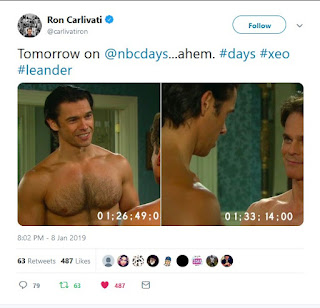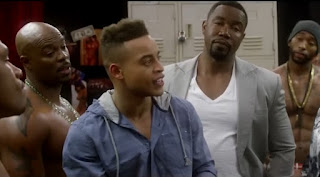Movie Review - 22 Jump Street
The joke of thirty-something men pretending to be high school students is inherently funnier than the same men pretending to be college students because the idea of older or older-looking college students is more likely in reality to be seen. The first joke fits because that idea is a long held trope or criticism of television shows dealing with protagonists in school, particularly high school. It fits because this movie is inspired or is a riff on the TV series 21 Jump Street.
How many criticisms or jokes were made about shows like Beverly Hills 90210 or Dawson's Creek about how the actors in them were too old or too old-looking to be believable high school students? Many shows, especially ones on the CW, are constantly guilty of employing sexy guys in their mid to late twenties to play 16 to 18-year-old teenagers, simply because they're sexy. The joke doesn't work or diminishes in college because obviously people of all ages attend college or take college classes.
The premise here is that two police detectives, Schmidt, played by Jonah Hill (Moneyball and The Wolf of Wall Street), and Jenko, played by Channing Tatum (G.I. Joe: Rise of Cobra and Magic Mike), go undercover at a university to investigate the death of a girl from a drug overdose. The drug is something new that Schmidt and Jenko have to figure out from where it's coming and who is peddling it. Hill is 30 and Tatum is 34, so this film repeatedly hits them over the head with the fact that they're old or look too old to be there.
Writers Michael Bacall, Oren Uziel and Rodney Rothman don't make as good a use of that premise as was done in the previous film. The previous film ran with the idea of what if you could go back to high school to see how your experiences would be better or worse. It also did a pretty good job of satirizing the post-Glee depiction of high school. Here, it clearly doesn't matter that they're in college. It's just a gimmick for the most part to further the bromance between Schmidt and Jenko.
The reason that this bromance doesn't work, whereas the one in I Love You, Man (2009) does, is the filmmakers here try to equate Schmidt and Jenko's relationship too much to being like a gay relationship without it actually being one. It seems odd that if they were going to go so far, then they might as well go all the way.
One of the refreshing things about the previous film is that it did have a gay character. The normative and accepting nature of that character is a key and highly refreshing point that is made. No such gay character exists in this comedy sequel and there are active attempts to combat homophobia, but there is a kind of homophobia in the placing of so many parallels to a gay relationship without having any of the characters be gay.
As odd as it sounds they took the romance part of bromance too far, so far that it almost felt like Schmidt and Jenko should and would kiss at the end, but they don't. The fact that they don't felt weirdly homophobic. Obviously, I'm not arguing that two straight guys can't have as close a relationship or one that is seemingly romantic, but the way the filmmakers frame things plays too much to the stereotypes that not to have them be gay makes no sense.
In the first film, Jenko is hit on by a woman but resists the female seductions. In this film, Jenko takes more to a studly football player. Because this football player is very similar in style and personality to Jenko, Jenko's attraction to the football player might just be a form of narcissism, but the arc of both films could believably be that Jenko is gay.
The two characters are in the same place in the beginning as they are in the end, which is together and with everyone else blocked out. During the movie, we see Schmidt and Jenko attempt relationships with others outside their bromance. By the end, those outside relationships are abandoned and the lesson the audience is supposed to take is that Schmidt and Jenko should be together, just the two of them and no one else.
This is where the bromance doesn't work unless the two are gay, or they're whatever the two men are in Clint Eastwood's J. Edgar (2011). This very issue is raised in the independent film Frances Ha but that film starring Greta Gerwig acknowledges what this one doesn't. Are the filmmakers suggesting that Schmidt and Jenko can't have friendships or any thing further like marriage or children with other people? Even if they were both gay, that would be a bit wrong-headed, but if they were gay, I would be more inclined to buy into it because then their love would make sense.
They're basically depicting an out-and-out gay relationship, but minus the sex. If you're going to go there, why not have them kiss? They were willing to play the joke of having Jenko pretend to give Schmidt a blow job, so what would a kiss at the end hurt?
This movie is less hilarious because a lot of it has literaly been cut and pasted from the previous.
Two Stars out of Five.
Rated R for language throughout, sexual content, drug material, brief nudity and some violence.
Running Time: 1 hr. and 49 mins.
How many criticisms or jokes were made about shows like Beverly Hills 90210 or Dawson's Creek about how the actors in them were too old or too old-looking to be believable high school students? Many shows, especially ones on the CW, are constantly guilty of employing sexy guys in their mid to late twenties to play 16 to 18-year-old teenagers, simply because they're sexy. The joke doesn't work or diminishes in college because obviously people of all ages attend college or take college classes.
The premise here is that two police detectives, Schmidt, played by Jonah Hill (Moneyball and The Wolf of Wall Street), and Jenko, played by Channing Tatum (G.I. Joe: Rise of Cobra and Magic Mike), go undercover at a university to investigate the death of a girl from a drug overdose. The drug is something new that Schmidt and Jenko have to figure out from where it's coming and who is peddling it. Hill is 30 and Tatum is 34, so this film repeatedly hits them over the head with the fact that they're old or look too old to be there.
Writers Michael Bacall, Oren Uziel and Rodney Rothman don't make as good a use of that premise as was done in the previous film. The previous film ran with the idea of what if you could go back to high school to see how your experiences would be better or worse. It also did a pretty good job of satirizing the post-Glee depiction of high school. Here, it clearly doesn't matter that they're in college. It's just a gimmick for the most part to further the bromance between Schmidt and Jenko.
The reason that this bromance doesn't work, whereas the one in I Love You, Man (2009) does, is the filmmakers here try to equate Schmidt and Jenko's relationship too much to being like a gay relationship without it actually being one. It seems odd that if they were going to go so far, then they might as well go all the way.
One of the refreshing things about the previous film is that it did have a gay character. The normative and accepting nature of that character is a key and highly refreshing point that is made. No such gay character exists in this comedy sequel and there are active attempts to combat homophobia, but there is a kind of homophobia in the placing of so many parallels to a gay relationship without having any of the characters be gay.
As odd as it sounds they took the romance part of bromance too far, so far that it almost felt like Schmidt and Jenko should and would kiss at the end, but they don't. The fact that they don't felt weirdly homophobic. Obviously, I'm not arguing that two straight guys can't have as close a relationship or one that is seemingly romantic, but the way the filmmakers frame things plays too much to the stereotypes that not to have them be gay makes no sense.
In the first film, Jenko is hit on by a woman but resists the female seductions. In this film, Jenko takes more to a studly football player. Because this football player is very similar in style and personality to Jenko, Jenko's attraction to the football player might just be a form of narcissism, but the arc of both films could believably be that Jenko is gay.
The two characters are in the same place in the beginning as they are in the end, which is together and with everyone else blocked out. During the movie, we see Schmidt and Jenko attempt relationships with others outside their bromance. By the end, those outside relationships are abandoned and the lesson the audience is supposed to take is that Schmidt and Jenko should be together, just the two of them and no one else.
This is where the bromance doesn't work unless the two are gay, or they're whatever the two men are in Clint Eastwood's J. Edgar (2011). This very issue is raised in the independent film Frances Ha but that film starring Greta Gerwig acknowledges what this one doesn't. Are the filmmakers suggesting that Schmidt and Jenko can't have friendships or any thing further like marriage or children with other people? Even if they were both gay, that would be a bit wrong-headed, but if they were gay, I would be more inclined to buy into it because then their love would make sense.
They're basically depicting an out-and-out gay relationship, but minus the sex. If you're going to go there, why not have them kiss? They were willing to play the joke of having Jenko pretend to give Schmidt a blow job, so what would a kiss at the end hurt?
This movie is less hilarious because a lot of it has literaly been cut and pasted from the previous.
Two Stars out of Five.
Rated R for language throughout, sexual content, drug material, brief nudity and some violence.
Running Time: 1 hr. and 49 mins.











Comments
Post a Comment